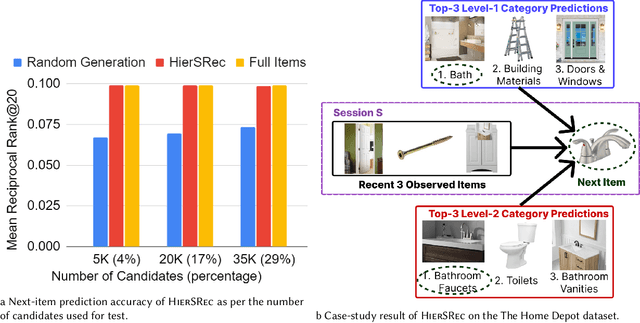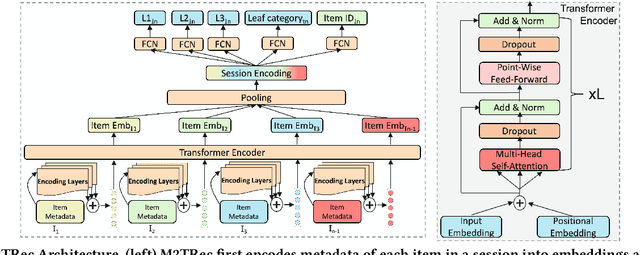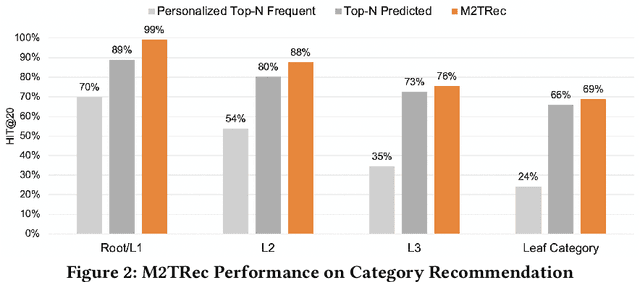Amir Afsharinejad
Hierarchical Multi-Task Learning Framework for Session-based Recommendations
Sep 12, 2023



Abstract:While session-based recommender systems (SBRSs) have shown superior recommendation performance, multi-task learning (MTL) has been adopted by SBRSs to enhance their prediction accuracy and generalizability further. Hierarchical MTL (H-MTL) sets a hierarchical structure between prediction tasks and feeds outputs from auxiliary tasks to main tasks. This hierarchy leads to richer input features for main tasks and higher interpretability of predictions, compared to existing MTL frameworks. However, the H-MTL framework has not been investigated in SBRSs yet. In this paper, we propose HierSRec which incorporates the H-MTL architecture into SBRSs. HierSRec encodes a given session with a metadata-aware Transformer and performs next-category prediction (i.e., auxiliary task) with the session encoding. Next, HierSRec conducts next-item prediction (i.e., main task) with the category prediction result and session encoding. For scalable inference, HierSRec creates a compact set of candidate items (e.g., 4% of total items) per test example using the category prediction. Experiments show that HierSRec outperforms existing SBRSs as per next-item prediction accuracy on two session-based recommendation datasets. The accuracy of HierSRec measured with the carefully-curated candidate items aligns with the accuracy of HierSRec calculated with all items, which validates the usefulness of our candidate generation scheme via H-MTL.
M2TRec: Metadata-aware Multi-task Transformer for Large-scale and Cold-start free Session-based Recommendations
Sep 23, 2022



Abstract:Session-based recommender systems (SBRSs) have shown superior performance over conventional methods. However, they show limited scalability on large-scale industrial datasets since most models learn one embedding per item. This leads to a large memory requirement (of storing one vector per item) and poor performance on sparse sessions with cold-start or unpopular items. Using one public and one large industrial dataset, we experimentally show that state-of-the-art SBRSs have low performance on sparse sessions with sparse items. We propose M2TRec, a Metadata-aware Multi-task Transformer model for session-based recommendations. Our proposed method learns a transformation function from item metadata to embeddings, and is thus, item-ID free (i.e., does not need to learn one embedding per item). It integrates item metadata to learn shared representations of diverse item attributes. During inference, new or unpopular items will be assigned identical representations for the attributes they share with items previously observed during training, and thus will have similar representations with those items, enabling recommendations of even cold-start and sparse items. Additionally, M2TRec is trained in a multi-task setting to predict the next item in the session along with its primary category and subcategories. Our multi-task strategy makes the model converge faster and significantly improves the overall performance. Experimental results show significant performance gains using our proposed approach on sparse items on the two datasets.
* Accepted at the 16th ACM Conference on Recommender Systems (RecSys '22)
 Add to Chrome
Add to Chrome Add to Firefox
Add to Firefox Add to Edge
Add to Edge